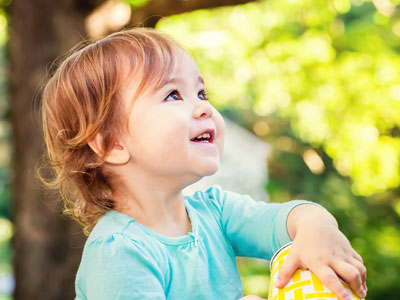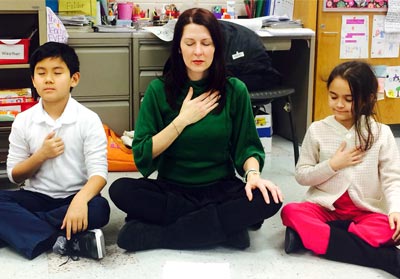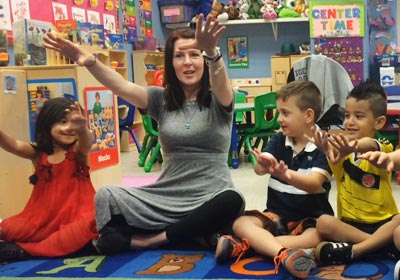
Mindfulness
“You can’t stop the waves, but you can learn to surf.”
— Jon Kabat-Zinn
EMOTIONAL SELF-REGULATION IS DIFFICULT FOR YOUNG CHILDREN. Today’s world is hectic and technologically driven, where constant multi-tasking has become the norm. This means that our children are constantly being bombarded by external stimulus which leaves them struggling with new emotions and challenging situations. Young children need help to learn strategies to support them in meeting and navigating these intense emotions. This is especially true for those in their critical years of early childhood development. Mindfulness practices help teach children these strategies. It’s been shown to improve children’s social skills, emotional well-being, as well as academic outcomes. In additional to this, it reduces feelings of stress, anxiety, depression or anger.
 At Bright Days, instead of attempting to control or eliminate perceived obstacles, we focus on strengthening positive human qualities. By doing this, children learn these critical techniques for meeting and navigating intense emotions. Mindfulness also cultivates positive states of mind like gratitude, kindness, joy and compassion. Additionally, it plays a role in effective communication and interaction, increasing social emotional skills.
At Bright Days, instead of attempting to control or eliminate perceived obstacles, we focus on strengthening positive human qualities. By doing this, children learn these critical techniques for meeting and navigating intense emotions. Mindfulness also cultivates positive states of mind like gratitude, kindness, joy and compassion. Additionally, it plays a role in effective communication and interaction, increasing social emotional skills.
All of our Early Childhood Educators not only carry on their own personal mindfulness practice, but they are experienced and qualified to pass this valuable knowledge on to your child. They have all received extensive training in teaching the Mindful Schools Curriculum to children. ![]() All Bright Days Educators have completed both the Mindfulness Fundamentals course, as well as the Mindfulness Educator Essentials course from Mindful Schools.
All Bright Days Educators have completed both the Mindfulness Fundamentals course, as well as the Mindfulness Educator Essentials course from Mindful Schools.
In addition to daily mindfulness exercises with the children at all of our child care homes, mindfulness is incorporated and encouraged during all activities throughout the day. Our goal is to ensure that the benefits and skills learned by the children become second nature to them.
![]()
WHAT IS MINDFULNESS? Simply put, mindfulness means maintaining a moment-by-moment awareness of our thoughts, emotions, bodily sensations, and surrounding environment. It has numerous research-backed benefits including the following:

Image courtesy of Mindful Schools
- Better Focus and Concentration
- Increased Sense of Calm
- Decreased Stress and Anxiety
- Improved Impulse Control
- Increased Self Awareness
- Skillful Responses to Difficult/Intense Emotions
- Increased Empathy and Understanding of Others
- Development of Natural Conflict Resolution Skills
Mindfulness is a practice of developing equanimity. In a nutshell, this means the ability to let go of reactive behaviour. The children are then able to respond from a place of greater ease, stability, and wisdom, rather than compulsion.

HOW IS MINDFULNESS PRACTICED?
We have incorporated the daily lessons from the Mindful Schools Curriculum into our custom Bright Days Curriculum. The lessons offer a variety techniques for achieving the benefits listed above, and have been adapted for the appropriate age groups. The practice of mindfulness include direct attentional training. Students are guided in exercises that focus on various skills and techniques, such as:

Image courtesy of Mindful Schools
- Helping children label strong emotional states that they are feeling (“name it to tame it”), creating a greater level of emotional awareness.
- Working with the breath in various ways to promote grounding and centering. Kids love the fun, animal-themed breathing ‘games’!
- Orienting and “anchoring” to sound, sight and the external environment (an easy way to engage the parasympathetic nervous system when a child is getting stuck in sympathetic/stress arousal). Bringing immediate attention to any of the 5 senses, helps to ground children.
- Practicing heartfulness and developing positive emotional states including kindness, compassion, and gratitude. Watching and hearing the children send kind thoughts to their friends and family is one of the most rewarding parts of teaching mindfulness.
The idea behind these techniques is that there is an actual art and science involved in learning how to self-regulate and shift attention. More than anything, it is a practice. For the techniques to work in stress and conflict situations, they must be practiced when the child is more relaxed and at ease. They must also be practiced in manageable doses that are tailored to each specific age group. This way, the children’s system becomes naturally accustomed to working with their attention and awareness over time.
In this way, the techniques are internalized. The main goal and practice at all Bright Days child care homes is to repeat short moments of practice with the children many times throughout the day.
![]()
DOES IT WORK? Executive function is a term that measures our capacity for higher level thinking. This includes abstract thinking, the ability to hear and follow directions, the ability to absorb information and repeat it. Research on the effects of mindfulness on executive function in adults has been taking place for the past 30 years. Because of the extensive benefits documented, in the last decade, research has been mounting on the benefits of mindfulness in children as well.
In 2011/2012, one of the largest randomized, controlled studies on mindfulness in children to date took place. It involved over 800 students in 2nd and 3rd grade in 3 different schools in Oakland, California. The results of this study showed that even a relatively short exposure to mindfulness had a significant impact on executive function. In addition to this, thousands of evaluations from both students and teachers were done to determine how mindfulness has helped them. The top three, self-reported benefits were:
- the ability to focus better in the classroom
- the ability to calm themselves down when they’re upset
- that mindfulness helps them make better decisions
Check out our Resources for links to more studies and research on Mindfulness.
How does it work?
Neuroscience research and brain MRI imaging has provided insight into how mindfulness affects our brains and improves executive function. Read more →